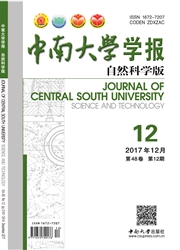

 中文摘要:
中文摘要:
Chiral ionic liquids (CILs) containing imidazolium cations and L-Proline (L-Pro) anions were applied as chiral selector to separate tryptophan (Trp) enantiomers on a C18 column by ligand exchange chromatography. Several factors influencing Trp enantiomers separation, such as alkyl chain length of CILs, concentrations of Cu2+ and CILs, pH of the mobile phase, flow rate, organic solvent and temperature, were studied. Under the optimal conditions, the Trp enantiomers could be successfully separated within 21 min with the resolution of 2.30. At the same time, some thermodynamical parameters were obtained. The experimental results show that the enthalpy values of the Trp enantiomers are negative, indicating that the separation process is exothermic. And the enthalpy values of D-Trp are larger than those of L-Trp, which indicates that L-Trp could form more stable ternary complexes with tryptophan enantiomers.
 英文摘要:
英文摘要:
Chiral ionic liquids (CILs) containing imidazolium cations and L-Proline (L-Pro) anions were applied as chiral selector to separate tryptophan (Trp) enantiomers on a C18 column by ligand exchange chromatography. Several factors influencing Trp enantiomers separation, such as alkyl chain length of CILs, concentrations of Cu2+ and CILs, pH of the mobile phase, flow rate, organic solvent and temperature, were studied. Under the optimal conditions, the Trp enantiomers could be successfully separated within 21 min with the resolution of 2.30. At the same time, some thermodynamical parameters were obtained. The experimental results show that the enthalpy values of the Trp enantiomers are negative, indicating that the separation process is exothermic. And the enthalpy values of D-Trp are larger than those of L-Trp, which indicates that L-Trp could form more stable ternary complexes with tryptophan enantiomers.
 同期刊论文项目
同期刊论文项目
 同项目期刊论文
同项目期刊论文
 Enantioselective extraction of clorprenaline enantiomers with hydrophilicselector of sulfobutylether
Enantioselective extraction of clorprenaline enantiomers with hydrophilicselector of sulfobutylether Enantioseparation of Mandelic Acid Enantiomers in the Ionic Liquids-water Two-phase Extraction Syste
Enantioseparation of Mandelic Acid Enantiomers in the Ionic Liquids-water Two-phase Extraction Syste Enantioseparation of 2-chloromandelic Acid Enantiomers by Ligand Exchange Chromatography Based on Ch
Enantioseparation of 2-chloromandelic Acid Enantiomers by Ligand Exchange Chromatography Based on Ch 期刊信息
期刊信息
